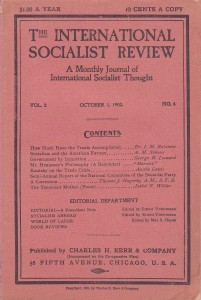 A Correction
A Correction
Van Buren, Ark., Aug. 25, 1902.
A. M. Simons, Editor International Socialist Review.
My Dear Comrade: The Cincinnati Enquirer, of the edition of August 22d, publishes a scare-head article anent my so-called resignation from the Catholic priesthood and asserts that “the reason assigned for his withdrawal from the ministry and communion of the Catholic Church, Father Hagerty states, is the church’s stand against Socialism and the incompatibility of her teachings with the doctrines of his economic creed.” I have never made such a statement. While it is true that I have withdrawn from the technical work of the ministry, the withdrawal implies no derogation of my sacerdotal character. I have not separated myself from the communion of the Catholic Church; and I hold myself as much a member thereof as the Pope himself.
The enemies of Socialism will stop at nothing to discredit its mission. The political bigot seeks always some prejudice or pretext of religion to warrant his attack upon the adversaries of his party; and the lines of Boileau need no new rendition for our day:
“Qui mèprise Cotin n’estime point son roi,
Et na selon Cotin, ni Dieu, ni foi, ni loi.”
I have no economic creed. A creed supposes faith; and faith is the receiving of doctrine upon authority. Knowledge, on the contrary, is the direct recognition of truth by the intellect. One may have a religious belief, but not an economic creed. I do not believe in any economic creed, but I know the definite philosophy of Socialism. No one would dream of going into a meat market and asking for a Catholic beefsteak, a Methodist mutton chop, or a Presbyterian ham. Religion has no more to do with Socialism than it has with meat and bread. Socialism is an economic science, not a system of dogmatic beliefs. It is wholly beyond the church’s mission to deal with questions of social economy, just as it is beyond the purpose of the Republican Party to advance a new exegesis of the Davidic Psalms.
Bishops and priests exceed their authority when they use the influence of their position to oppose a movement whose highest purpose is the industrial liberation of the wage slaves of the world. According to the strictest interpretations of moral theology, Catholics are not bound to pay any attention to them in such matters. The Pope’s encyclicals on the question have no more authority than that which attaches to the opinions of any private theologian. The function of his office is confined strictly to matters of faith and morals. His judgment upon a canvas of Fra Angelico or a fragment of the Tel-el-Armana tablets is as much open to criticism as that of any other scholar.
It is to be regretted that a few bishops and priests, out of the abundance of their ignorance, have seen fit to attack the principles of Socialism, but it does not, therefore, follow that the doctrines of the church, as such, are in conflict with the truths of Socialism. The churchmen of the primitive days were genuine Socialists — men like St. John Chrysostom, who denounced the Capitalism of his day in the most acid words of the wondrous Greek in which he preached. With Whittier, rightly may
“I sigh for men as bold
As those bearded priests of old.“Now too oft the priesthood wait
At the threshold of the state —
Waiting for the beck and nod
Of its power as law and God.”
Nevertheless, I thank God that such men as Father McGrady are gradually opening the eyes of Catholics to a sense of their rights in the field of industry and to a recognition of their individual freedom in all things outside of the fixed lines of dogma and revelation.
Thos. J. Hagerty, A. M., S. T. B.
From pages 229 – 230 of the October 1, 1902 edition of The International Socialist Review (purchased at an estate sale on October 5, 2013 by Monsieur d’Nalgar).
